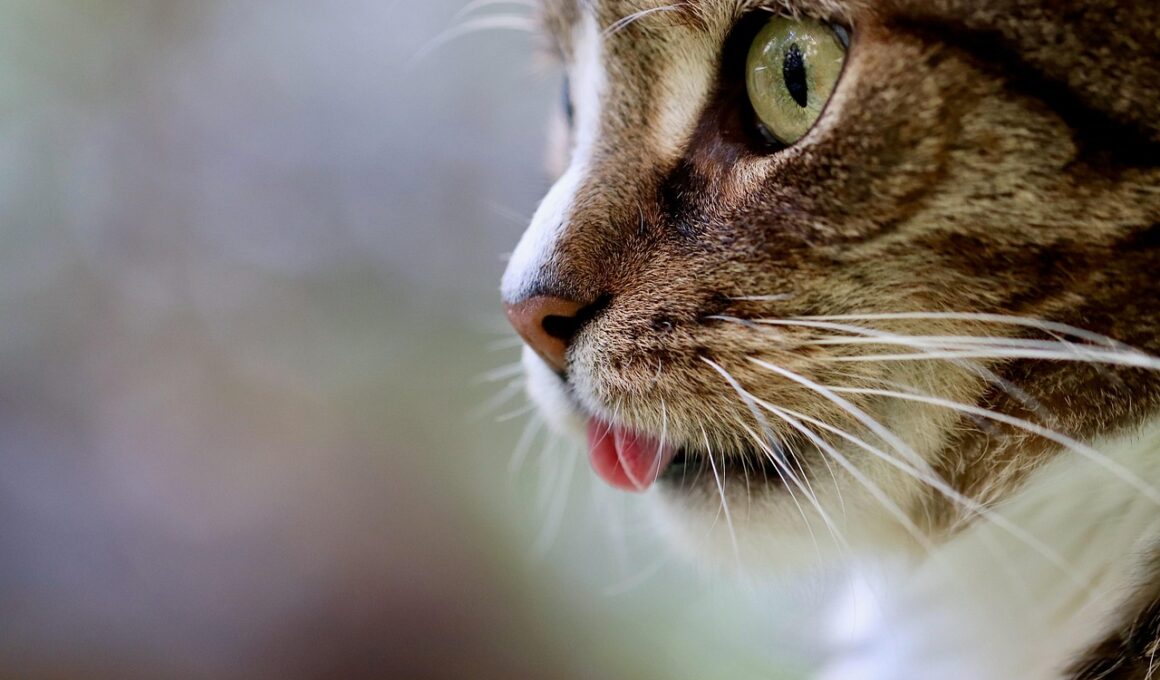The Benefits of Probiotics for Cats with Digestive Disorders
Probiotics have gained significant attention in the world of pet health, especially concerning cat nutrition. These beneficial microorganisms can play a crucial role in maintaining digestive health for felines suffering from digestive disorders. Cats naturally possess a balance of bacteria in their intestines, but many factors can disrupt this equilibrium, leading to gastrointestinal issues. By incorporating probiotics into a cat’s diet, owners can aid in restoring this balance, thereby promoting improved digestion and nutrient absorption. Probiotics can help alleviate symptoms such as diarrhea, constipation, and bloating, which are commonly experienced by cats with sensitive stomachs. Additionally, regular intake of probiotics can stimulate the immune system, ensuring overall wellness. Remember to consult with your veterinarian before introducing any new products into your cat’s diet, especially if your feline has preexisting health conditions. There are various forms of probiotics available, including powders, treats, and liquid supplements. Each comes with its advantages, so selecting the right option for your cat’s preferences is crucial. The end goal is to find a formulation that your cat enjoys and can easily incorporate into their daily routine, maximizing their benefits.
The digestive system of cats is quite unique, requiring a specialized approach to nutrition and health. One of the key benefits of probiotics is their ability to enhance digestive efficiency, particularly in cats experiencing disorders. Probiotics introduce beneficial strains of bacteria that can outcompete harmful bacteria, leading to a healthier gut environment. Research suggests that introducing these supplements stabilizes gut flora and may lead to reduced gastrointestinal disturbances. In addition to mitigating digestive issues, probiotics can also aid in managing the effects of antibiotic treatments, which often disrupt gut bacteria balance. By restoring normal gut flora after antibiotic use, probiotics can help cats regain their digestive health more effectively. Moreover, these supplements may provide additional health benefits. For instance, some studies show that probiotics can positively influence mood and behavior by supporting brain-gut communication. This might help cats feel less anxious, reducing stress-related digestive symptoms. With various types of probiotics available, it’s essential for pet owners to choose products that target specific digestive concerns. Always read labels and research options thoroughly to confirm the appropriate strains of bacteria are included.
Improved Nutrient Absorption
Probiotics not only combat digestive disturbances but also enhance nutrient absorption in cats. A healthy gut ensures that essential vitamins, minerals, and other nutrients are effectively absorbed into the bloodstream, providing the necessary support needed for optimal health. When gut bacteria are imbalanced, it can hinder the absorption process, leading to deficiencies, even if a cat’s diet seems adequate. Cats experiencing digestive disorders may benefit significantly from enhanced nutrient uptake facilitated by probiotics, ensuring they receive all the nutrients required for a healthy life. In turn, a well-nourished cat is often more energetic, with a better coat condition and overall wellness. Research also indicates that certain strains of probiotics promote the breakdown of food, making it easier for cats to derive essential nutrients, aiding in healthier weight management. Consequently, adding probiotics to a cat’s diet can be viewed as a twofold strategy: addressing digestive issues while simultaneously ensuring maximal nutrient absorption. When shopping for probiotics, look for products specifically formulated for feline digestion to maintain that crucial balance. Consulting with a veterinarian can clarify which strains are necessary for each cat’s unique dietary requirements.
Another significant advantage of probiotics is their role in strengthening the immune system. A large part of a cat’s immune system resides within the gastrointestinal tract, underscoring the importance of maintaining gut health. When the balance of gut bacteria is disrupted, it can lead to increased susceptibility to infections and disease. Probiotics can help reinforce the intestinal barrier function, preventing harmful pathogens from entering the bloodstream. Studies show that regular probiotic intake can lead to a more robust immune response. This is particularly vital for cats with existing digestive disorders, as these conditions can weaken their immune defenses. In addition to protecting against infections, a healthy gut flora may help reduce inflammation and promote recovery from gastrointestinal illnesses. Nutritious cat food, combined with effective probiotics, can foster a holistic approach to feline health management. Careful selection of probiotics tailored for cats ensures they receive species-specific benefits, which is crucial for effectiveness. Always monitor your cat’s health closely when introducing probiotics to identify any improvements or reactions. A veterinarian’s guidance is invaluable in determining the best probiotic course to enhance overall health and recovery.
Stress Relief and Behavioral Improvement
Stress can significantly affect a cat’s digestive health, sometimes leading to disorders that require careful management. Probiotics can help alleviate stress-related digestive symptoms by restoring gut balance, resulting in calmer behavior. A well-balanced gut may contribute to reducing anxiety and promoting relaxation. For instance, stressed cats show symptoms such as diarrhea or loss of appetite. By normalizing gut flora, probiotics can potentially mitigate these harmful effects and aid in behavioral improvement. Research suggests that a healthy gut microbiome influences not just physical health but mental well-being too. By supplementing with probiotics, owners can offer their cats a natural tool for stress reduction without relying solely on medications. This holistic approach encourages a balanced lifestyle, ultimately leading to better behavior and health outcomes. Regular interaction with your cat and understanding their unique stress triggers can complement probiotic therapy. Observing their reactions and changes in behavior can inform if the chosen probiotic is effective. Positive social interactions and mental stimulation, combined with proper nutrition and probiotics, can ensure a happier, healthier cat overall. A veterinarian’s insights can further enhance strategies for managing stress and supporting gut health.
To conclude, integrating probiotics into feline diets offers several health advantages, particularly for cats with digestive disorders. By promoting gut health, enhancing nutrient absorption, and bolstering the immune system, these beneficial microorganisms play a vital role in overall feline health management. They simplify the management of digestive disorders and create an environment for improved well-being. While selecting the right probiotic, factors such as formulation, strain variety, and target health issues must be considered. Choosing vet-recommended products and monitoring your cat’s response can optimize the advantages of probiotics. It is essential to remember that every cat is unique, and individual health conditions may vary. Therefore, pet owners must adopt a personalized approach when integrating probiotics into their cat’s diet. Consistency is crucial — regular supplementation can lead to long-term health benefits. The connection between gut health and overall health is becoming increasingly acknowledged in veterinary medicine, highlighting the importance of a probiotic-rich diet for cats. As research continues to expand, more evidence is paving the way for making probiotics a staple in cat nutrition, ensuring our furry companions lead healthier lives.
To wrap up, probiotics emerge as a pivotal component in enhancing the health of cats, especially those grappling with digestive disorders. Their diverse benefits encompass alleviating gastrointestinal issues, promoting efficient nutrient absorption, reinforcing the immune system, relieving stress, and positively impacting cat behavior. All of these play a critical role in not just managing existing health issues but fostering overall well-being. Those wishing to introduce probiotics should consider consulting with a veterinarian, who can provide expert guidance concerning appropriate products and dosages suitable for specific feline needs. With the vast assortment of available probiotics for cats, selecting the correct formulation tailored to individual preferences and requirements is essential. Monitoring your cat’s progress will help determine the effectiveness of the chosen probiotic, ensuring that it meets their health goals. Furthermore, as scientific understanding evolves, embracing such beneficial health strategies will continue to enrich the lives of our feline companions. Healthy cats not only lead happier lives but also deepen the bond we share with them. Probiotics, as part of a comprehensive health strategy, hold great promise for enhancing cats’ health and happiness.


